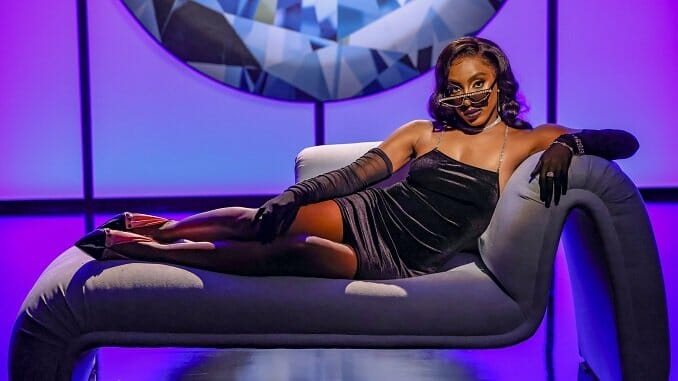Ziwe: The Pop-Star and Satirist Extraordinaire Discusses Her New Showtime Series
Photos by Greg Endries/SHOWTIME
“My greatest hope is that all of these societal issues are solved and my songs are irrelevant.” Nigerian-American comedian Ziwe lets out an earnest laugh alongside me as we discuss the satirical musical segments of her forthcoming A24 produced Showtime series ZIWE, a variety show in which the comedian is every episode’s musical guest. ZIWE’s pop music is a continuation of the political aims embedded in her debut 2018 EP Generation Ziwe. On it she critiques the myriad of injustices woven into the American social fabric. For example, in the EP’s leading single and all-around twerk anthem “Make it Clap for Democracy” Ziwe encourages Lady Liberty to “shake that ass.” Hilarious. But the lyrics also remind her listeners that Trump’s administration would gladly “disenfranchise every one of [us] hoes” by purging voter lists. On “Universal Healthcare,” the EP’s final track, Ziwe cogently asks over a trap beat “what the fuck is a deductible?” Premium Grade A+ question.
One of Ziwe’s greatest comedic strengths is understanding how to employ humor through various means—music, sketch comedy, interviews, etc.—to highlight the absurdity of our American reality and the fundamental discomfort people have with discussing this nation’s legacy of racism, sexism and injustice on the whole. On her Instagram Live series Baited with Ziwe, Ziwe interviewed iconic guests like internet celebrity Caroline Calloway, Alyssa Milano, and Slave Play playwright Jeremy O. Harris, among others. Through the series and its increased popularity during the summer of 2020, Ziwe became renowned for unabashedly asking her predominantly white guests confrontational questions about race.
The legacy of her live series carries over into her Showtime show. In the official promotional video for ZIWE, which premieres on May 9, the comedian asks notorious New Yorker Fran Lebowitz “what bothers you more, slow walkers or racism?” Because of this brand of humor and her refusal to hand anyone an “ally cookie” for basic interpersonal decency, some might misinterpret Ziwe’s satire as elevated trolling—bullying masquerading as niche comedy. But if one only looks closely enough it becomes abundantly clear that Ziwe is deeply uninterested in tearing any individual guest down but rather drawing attention to the discomfort people have with the possibility of discomfort itself. Her comedy is crafted to showcase how fearful people are of saying the “wrong thing” or revealing gaps in their knowledge. Ziwe’s comedy implicitly asks “why are people more afraid of appearing racist, sexist, etc. than actually being any of those things?” When Ziwe asks “what the fuck is a deductible?” over a trap beat it’s because that a funny thing to do. But it also gives listeners time to reckon with the fact that healthcare in America is so unnecessarily complicated and inaccessible that it took a talented comedian and a trap beat for them to sit and intentionally ask themselves why and question if it has to be.
When I asked Ziwe about her brand of humor, which some have dubbed cringe comedy, she concurs that her art isn’t about being biting or topical. Rather comedy is the way she knows to navigate her own trauma: “I have been in a myriad of awkward shit situations all my life where I was forced to talk about race. And in those awkward, cringey situations that were happening in my real practical life I found humor in that trauma. Because you talk to these people as they corner you in a bar and go ‘I wish someone could have watched that conversation, it’s so ridiculous, it’s so absurd.’ I took these life experiences—art imitates life— and translated into my work. Its [the comedy] as organic as experiencing these conversations all my life, every day since I could speak.”
The music of ZIWE, like the comedy of the show on the whole, provides a sense of catharsis for Ziwe. “I’m trying to heal myself through my art and hopefully heal other people,” she says. “I process trauma with comedy, it’s how I compute things. So that’s what you’re seeing in my comedy—awkward, cringe, discomfort—because that’s what we’re all processing together.”

-

-

-

-

-

-

-

-

-

-

-

-

-

-

-

-

-

-

-

-

-

-

-

-

-

-

-

-

-

-

-

-

-

-

-

-

-

-

-

-








































